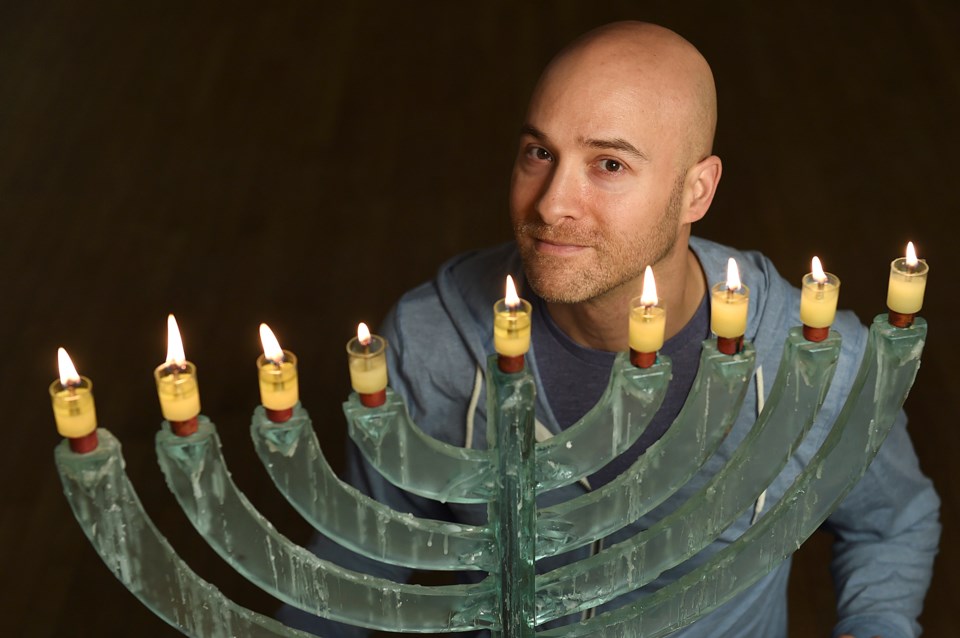When we worked together years ago, I gave my friend Kyle Berger a Chanukah gift, a bottle of cheap sparkling wine bedecked to look better than it was. In return, he gave me a little lecture about how Chanukah is really a minor Jewish holiday that gets its cachet from its proximity to Christmas.
I recently reminded Kyle of that years-ago interaction. Having two kids in the interim softened him on the Chanukah front, though he was never truly a Chanukah grinch. He was just making a point and I did take some of what he said to heart. Many people will wish their Jewish acquaintances a Happy Chanukah, but may not have any idea about Passover, Rosh Hashanah or Yom Kippur, which are far more significant dates in the Jewish religious year. In other words, wishing people Happy Chanukah can be seen as an oddly Christian-centric form of multiculturalism.
But that is too grinchy. And Kyle agrees.
“From a religious perspective, it’s low on the totem pole,” he says. “But from a cultural perspective and an opportunity to engage with family, it’s probably higher up there.”
This year, the shifting Jewish calendar means that the eight-day celebration of Chanukah begins on Christmas Eve and ends on New Year’s Day, a rare coincidence that makes the compare and contrast Christmas/Chanukah dichotomy especially apt. For Kyle, it’s also the first time in his 40-odd years that he’s celebrating Christmas. He’s heading to Â鶹´«Ă˝Ół»Island to be with his girlfriend’s family.
“I’m excited about it because I’m imagining that spirit of sitting around, we’ll have a Christmas Eve dinner, hot cocoa, drinks, go to sleep, wake up in the morning, exchange gifts, play games, enjoy each other’s company.”
He has pondered what might happen if he and his girlfriend moved in together. She would want a Christmas tree and he doesn’t have a problem with that either, particularly because, for her, it is a symbol of tradition and not particularly religious.
This is remarkably similar to Chanukah, he adds, which does not originate from religious tradition, but from Jewish history, when Greek control over the area around Jerusalem led to the oppression of Jews and the desecration of the Temple 2,200 years ago.
A Jewish revolt resulted in victory and the Temple was rededicated. But the menorah in the Temple and the oil to burn in it had been desecrated and it would take eight days to produce the virgin olive oil required for ritual purity. One flask of unpolluted oil was found — enough to burn for a single day. By a miracle, the story goes, it burned for eight days, the Temple was rededicated and the Jewish people were free. (For a while anyway; the story continues.) For the purposes of most celebrants today, the miracle of the oil translates into an artery-clogging feast of fried foods, especially latkes (potato pancakes) and sufganiyot (jelly doughnuts). So overeating and indulging is another area of interfaith overlap.
So is light in the midst of darkness. The Christian story of a star guiding admirers to the place of Jesus’s birth is marked by lights on trees and on houses. For Jews, Chanukah involves lighting increasing numbers of candles, from one on the first night to eight on the final night of Chanukah.
There is little doubt that the relatively new tradition of giving gifts on Chanukah is also a result of Jewish kids in North America feeling left out of the Christmas fun. (It’s less of a big deal in Israel, where Christmas isn’t so in-your-face.) There is nothing in Jewish theology, Kyle says, that dictates gift-giving. And, except for the example of the Wise Men bearing gifts for the baby Jesus, there isn’t really anything official in Christianity about that either.
Chanukah gifts tend to be more modest than the booty under some Christmas trees. “For me, growing up, the long-standing joke was that every year I would get felts or markers or something like that for Chanukah,” he says. His kids can expect seven nights of little items and maybe one night with a bigger payload.
“Generally, I’ll try to look for one thing that’s a little bit more significant, something that we know that they really want,” he says, “and the other nights will be little treats, arts-and-crafts-type gifts or maybe some clothes that we probably think they need anyway. Maybe an activity that we’ll do with them.”
Previous generations of Jewish parents, and some still, have worried about turning Chanukah into a Jewish Christmas. But Kyle thinks his kids are smart enough to understand the difference.
“We’ve always been very clear with them that we are Jewish and these are the holidays that we celebrate and these are the things that we believe and the traditions we follow,” he says.
“But other kids follow these other traditions. We live in a community and a society where Christmas is very prominent and we’ve never hid that from them.
“We’ve embraced it in a lot of ways,” he adds – and not only this year when Kyle may actually get his own stocking. “For me, personally, Christmas or the holiday season is one of my favourite parts of the year, because I just feel like there’s a certain spirit and a certain energy everywhere that comes with it. Whether it’s about Chanukah, whether it’s about Christmas, whether it’s just about cold weather, ultimately what I appreciate the most is that [the holidays are] about family, bonding, being with the people that you love, spending quality time with people. There are school holidays and most people’s work slows down a little bit, people take days off and all of these holidays are associated with family time and friend time and being with people that you love and keeping warm.”



